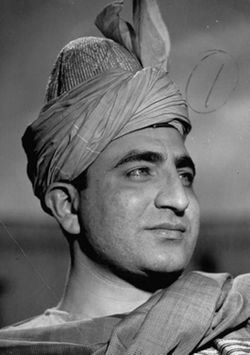Abdul Ghani Khan facts for kids
Quick facts for kids
|
|
|---|---|

Khan in the 1940s
|
|
| Born | c. 1914 Hashtnagar, North-West Frontier Province, British India (present-day Khyber Pakhtunkhwa, Pakistan) |
| Died | 15 March 1996 (aged 81–82) Charsadda, North-West Frontier Province, Pakistan (present-day Khyber Pakhtunkhwa, Pakistan) |
| Pen name |
|
| Nationality | |
| Notable work | Da Panjre Chaghar, Panoos, The Pathans, Da Ghani Latoon, Kuliat-e-Ghani |
| Notable awards | Sitara-i-Imtiaz (1980) |
| Relatives |
|
Khan Abdul Ghani Khan (Pashto: خان عبدالغني خان; around 1914 – 15 March 1996) was a famous Pakistani Pashto language philosopher, poet, artist, writer, and politician. He was the son of Abdul Ghaffar Khan, a well-known leader who worked for India's freedom from British rule.
People knew Ghani Khan by special names. They called him Lewanay Pālsapay (which means "Mad Philosopher"). They also called him Da īlam Samander (meaning "Ocean of Knowledge"). These names show how wise and creative he was.
Contents
His Life Story
Ghani Khan was born in a place called Hashtnagar. This area was part of British India at the time. Today, it is near the village of Utmanzai in Khyber Pakhtunkhwa, Pakistan.
His father, Abdul Ghaffar Khan, was a big leader fighting for India's freedom. Ghani Khan was also the older brother of Abdul Wali Khan. His wife, Roshan, came from a Parsi family.
Ghani Khan loved art. He studied at an art school in Rabindranath Tagore's University in Shantiniketan. There, he became very good at painting and making sculptures. He also traveled to England and studied sugar technology in the United States. After his studies, he came back to British India. In 1933, he started working at a sugar mill.
His Time in Politics and Jail
Ghani Khan was involved in politics because of his father. He supported the Pashtun people in British India. However, he later stopped being active in politics. Even so, the Government of Pakistan arrested him in 1948. He stayed in jail until 1954, held in different prisons across the country.
During his time in prison, Ghani Khan wrote many poems. He created his famous collection of poems called Da Panjray Chaghaar. He believed this was his best work ever. For a long time, the Pakistani government did not recognize his writings. But later in his life, his work became very popular. He even received an award called the Sitara-i-Imtiaz in 1980. This award was for his great contributions to Pashto literature and painting.
His Writings
Ghani Khan wrote many poems. Most of his poetry was not about politics. His main poem collections include Panoos, Palwashay, De Panjray Chaghar, Kullyat, and Latoon.
He also wrote books in English. His first English book was called The Pathans, published in 1947. He also wrote one book in Urdu, titled Khan Sahib, which came out in 1994.
What made his poetry special was how he mixed different ideas. He combined his knowledge of local and foreign cultures. He also wrote about feelings, senses, and religious ideas. His poems showed a deep understanding of life.
Some of Ghani Khan's poems were translated from Pashto into English. This collection is called The Pilgrim of Beauty. It has 141 poems and was published in 2014.
Famous Quotes
Ghani Khan loved nature and the Pashtun people's way of life. This love is clear in his writings. Here are some of his famous quotes:
- "Pashtun is not just a group of people. It is a way of thinking. There is a Pashtun inside every person. Sometimes, this part wakes up and takes over."
- "The Pashtuns are like wheat grown in the rain. They all grew up on the same day. They are all alike. But I love a Pashtun most because he will clean his face, oil his beard, and wear his best clothes when he goes to fight and die."
- As a forward-thinking writer, he also wrote: "I want my people to be educated and smart. A people with clear goals and a strong sense of what is fair. They should be able to create a good future for themselves, living in harmony with nature."
Remembering Ghani Khan
Abdul Ghani Khan passed away on 15 March 1996. He was buried in Utmanzai, Charsadda.
After he died, the government of Khyber-Pakhtunkhwa Province honored him. They built a public library and a park in his memory. This memorial is called "Ghani Derai" (which means "the mound of Ghani"). It is located near his home in his village of Utmanzai.
See also
- Abdul Ali Khan
- Khan Abdul Bahram Khan
- Abdul Ghaffar Khan
- Abdul Wali Khan
- Family of Bahram Khan
- Utmanzai (Sarbani tribe)
 | Victor J. Glover |
 | Yvonne Cagle |
 | Jeanette Epps |
 | Bernard A. Harris Jr. |

